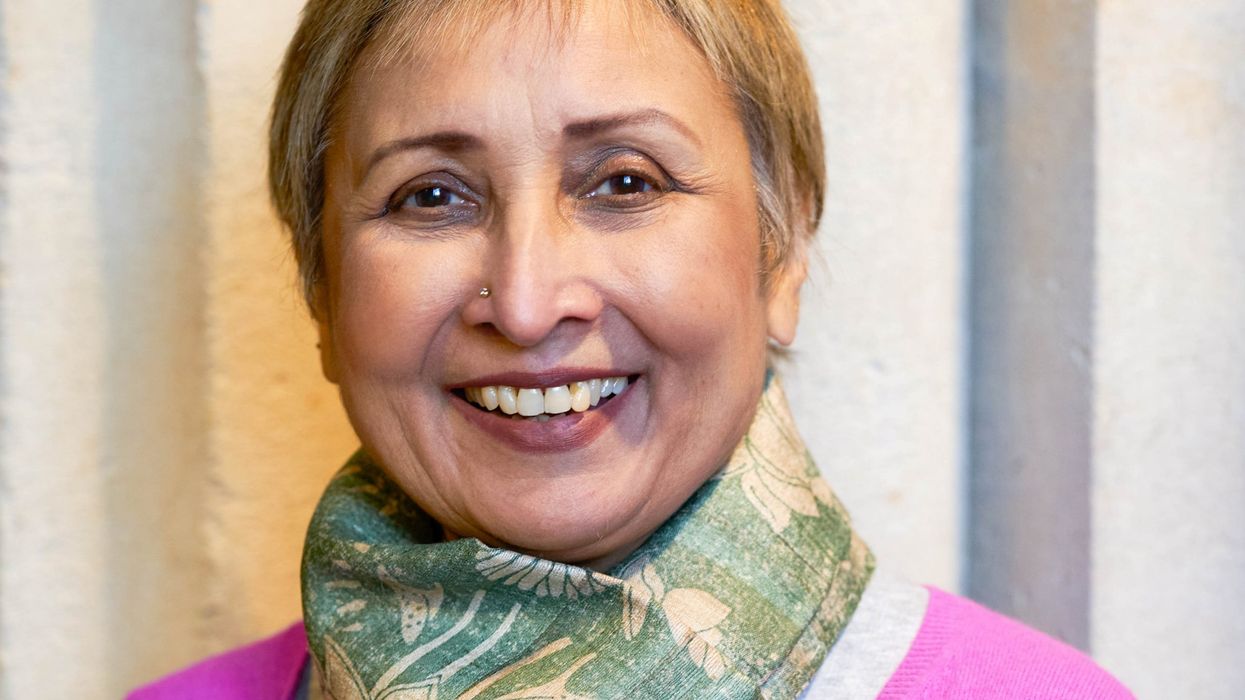STORYTELLING has existed since the dawn of time and was an early way of documenting history, but over time, it was replaced with things like books, theatre plays, films, art, and technology.
Vayu Naidu has kept the ancient art of live storytelling going with magnetic performances for all ages. The acclaimed British theatre impresario delivers her new show SHE as part of this year’s Women In The Arts festival at Tara Theatre in London next Sunday (13). The collection of thought-provoking stories about the power of women draws from diverse influences ranging from ancient philosophies to a force
field of energy.
Eastern Eye caught up with her to discuss SHE, the art of storytelling, live theatre and why stories still matter.
What first connected you to creativity?
The constant feeling that there are different ways of expressing my thoughts rather than daily speech. Strong visual imagery helped me want to express that with feeling in spoken words.
What drew you towards storytelling?
Tales I would hear at festivals in India. There was always a story, and the narrations were often accompanied by music and dance. After many careers, I focused on the magic of this storytelling and how it drew people into their own imagination. So, I did a doctorate in it from the University of Leeds.
What has the experience of telling stories on stage been like?
The wonder of storytelling is the story and people who give their time and imagination to listen. The people, story and I have an interconnection and some unique life takes place in the telling and meaning of the story. There is great preparation needed. At the end, when the audience experiences something that makes for a greater understanding, makes me feel extremely fulfilled.
How did your latest project SHE come about?
SHE started out as a celebration of a force field called Shakti, and is a manifestation associated with female and dynamic qualities in Indian traditions of performance, derived from its philosophies. As a storyteller my tools are words, images and emotional intelligence.
Tell us more about the show?
In selecting and composing stories about particular women from world mythologies, the essence of SHE is this force field of energy which will be brought to light. Alice Barron, a talented violinist in classical western and Carnatic Indian music, and I will be sharing this interweaving of sound and stories to create something new and refreshing.
Who are you hoping will connect to these stories you tell?
Women and men, and young people, 12 years and above. The connection is about sitting in a space and travelling through stories to a new horizon of understanding of how things come to be.
What is your favourite story or moment from SHE?
When a new understanding grows with harmony from an old misunderstanding.
How do you feel about being part of the Women In The Arts festival?
It’s a terrific privilege to be part of the festival curated by Jay Visvadeva. He has previously brought on stage the greatest artists who have passed on and continues to encourage new talent, and against all odds, creates a platform for new expressions of old traditions. While most performers are there with music and dance, it’s great to have storytelling placed here too.
What is the secret of great storytelling?
Listening – listening intently not just by the audience, but also the storyteller, to the meaning of the story, why it needs to be told, rather than any other? What is our context now? Also, the storyteller has to listen to the heartbeat of the ‘time’, of the audience. It is interesting when so many different listeners are travelling in the story from their diverse ways of thinking, and suddenly at one moment, the storyteller (who has been listening) chimes in with a word or phrase, and everyone understands, with a nod or smile of recognition.
Why do stories matter?
Stories are the culture of the heart and mind. We learn from folk tales about consequences of behaviour. We learn to admire people who show courage when we hear or read the story about them. The greatest thing stories do is awaken our emotional intelligence. We learn the difference between jealousy and love, about insecurities, what fear can do to us and what it takes to be courageous. We can learn what it means to weep for another or rejoice for them. Real stories go beyond propaganda, not about nationhood, or calls to war or hatred. Real stories open the knot of the heart, whoever and wherever we are.
Which is your own favourite story?
It’s a dialogue between two people and the truth about love.
How have stories shaped you?
It has made me observe and listen to people in a way I could not do before. I hear the tone of their voice and facial expressions, and begin to understand, at times, what they want to say, but find it difficult to do so. This connectedness is crucial in all walks of life. It brings a harmony, much needed, with understanding. I often wonder why ‘customer services’ in all corporates can’t do this.
Why should we come and watch SHE?
If you enjoy being in the moment and spending an evening of relaxation, then SHE will energise you. If you don’t know what storytelling really is and want to try it, then SHE will open a new page for you. If you love stories but have not heard a storyteller before, then SHE will open new avenues of what this force field of Shakti is through stories from around the world.
Finally, why do you love live theatre?
I’ve been going on about force fields and energy. That’s what live theatre does. Watch when people are left alone for a long time with all their needs and TV around them. The moment other people come around to meet, a new energy enters them. Live theatre is like that – that’s why the storyteller needs to listen well, as we all will be travelling through the story, to gather something that renews us.
Visit www.taratheatre.com and www.sama.co.uk for more.












